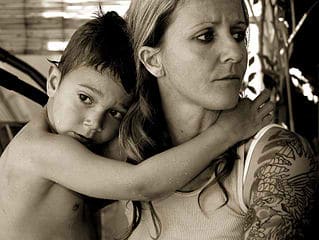Everyone has some degree of fear of abandonment, some more, some less. It comes from our instinct for attachment. We need each other.
It starts at birth, when we are one hundred percent dependent on another for physical and emotional survival. This attachment becomes the foundation for growth. Gradually, from this dependence, a child may learn independence.
Healthy relationships understand how dependence and independence work together. There is then the opportunity for love, safety, trust, compatibility and individual expression.
As we become more aware of how we need others physically and emotionally and how we need individual identity, our relationships can thrive.
The Spectrum of Fear of Abandonment
 Fear of abandonment can be looked at on a spectrum. Someone might have the occasional flash of abandonment fear and be able to respond to it in a reasonable way. Some have the fear often, struggling throughout the day and then some do not even know this fear exists within them but organize their life around avoiding rejection.
Fear of abandonment can be looked at on a spectrum. Someone might have the occasional flash of abandonment fear and be able to respond to it in a reasonable way. Some have the fear often, struggling throughout the day and then some do not even know this fear exists within them but organize their life around avoiding rejection.
One can feel possessed by it and have extreme difficulty in relationships. Relationships become the trigger for unconscious fear of abandonment.
For example, one may interpret what their partner says as if they are abandoning them, but in reality they just wanted to go take a nap or do something by themselves.
We need fear at a survival level. Fear indicates danger. But when the fear becomes too large and too irrational it contaminates our relationships as well as our everyday life experiences.
For example, I have seen clients that were abandoned by parents through death, divorce, abuse or just an inability to be a grown-up parent. I have seen clients that have been abandoned by culture through racism and sexism that has gone on for generations. These experiences need reflection and care.
We fear loosing a loved one physically or emotionally, of course. But when it gets mixed up with hurt from the past it becomes problematic. So coming to terms with this fear of abandonment and the many dependences we have as human beings is a piece of work, to say the least. But what else is there to do?
Our emotional state is involved in everything we do anyway, whether we are aware of it or not. Repression and blame make us and those around us sick. But they also show us where the work is.
For example, if I can become aware of my repressed fear, I can understand the false story I am telling myself, I can talk about it, and then understand what is real and not real. We all need to learn healthy separation: a balance of dependent and independent.
We gradually learn how to recognize the fundamental dependance we have on others for love, safety, trust, compatibility, etc., and at the same time take individual responsibility for what is our work as individuals. The result of this responsibility and work is clarity of what’s mine, what is yours, and what is ours.
Extreme Fear of Abandonment
The symptoms of borderline personality disorder can be understood through an image. An image of an infant being abandoned by everyone, possessed by devouring helplessness and hopelessness to care for itself, empty aloneness. This infant may then have an additional experience of being brutalized. This is why so many of the borderline personality disorder symptoms include a fantasy of suicide as if it will solve the problem.
We can see from this image, abandonment issues are based in this pervasive desperation for attachment but no one is available.
The term personality disorder is meant to describe the degree of overwhelm. Therefore, personality disorder symptoms mean that the symptoms, such as, fear of abandonment and rage are crippling ones life, and one’s personality, particularly in the area of relationship.
Borderline personality disorder relationships fluctuate from love and adoration to aggression and anger, just as a child might. This vulnerable child did not have enough attachment, enough selfless love to bridge the opposites of love and anger. They did not have enough guidance to learn how to manage painful emotions.
As I pointed out in the beginning, everyone has some experience of these feelings, but they are not as overwhelming as someone with bpd symptoms. The most difficult problem is to recognize how much the fear of abandonment drives our behavior.
Looking at how much I am being lived by the fear of abandonment, instead of living with the fear of abandonment is the first step.
Learning how to differentiate these young feelings through awareness is the goal.
Those with the bpd symptoms are finding good results with dialectical behavior therapy which was adapted out of the mindfulness meditation tradition.
More on Borderline Personality Disorder:
Borderline information: http://psychcentral.com/blog/archives/2013/09/06/borderline-understanding-the-patients-that-psychologists-fear/
